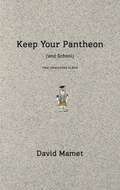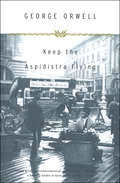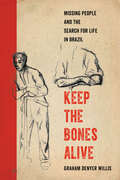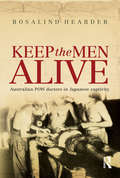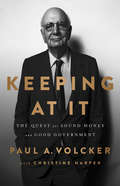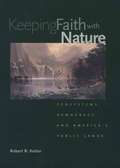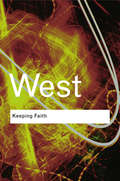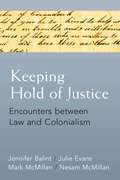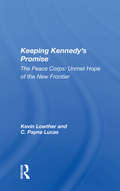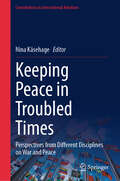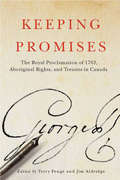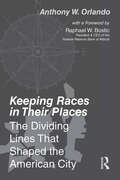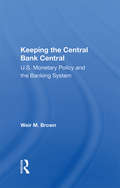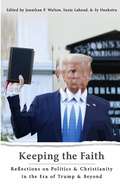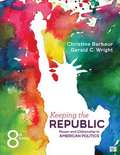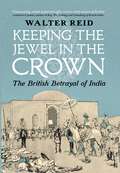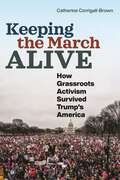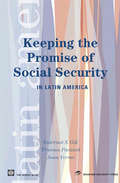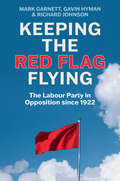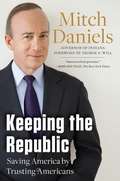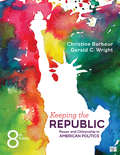- Table View
- List View
Keep Your Pantheon (and School)
by David MametBest known for his precision-blade language and hot-button subject matter, David Mamet shows off a lighter side with his equally dexterous screwball comedy Keep Your Pantheon. Featuring an over-the-hill acting guru who lusts after both his toga-clad protégé Philius and a spot in the Sicilian Cork Festival, Mamet's play returns to the roots of comedy, paying homage to the Roman playwright Plautus, whose works also inspired Shakespeare's The Comedy of Errors and the musical A Funny Thing Happened on the Way to the Forum. This volume also contains School: a crackling curtain-raiser in which two teachers shoot back-and-forth on topics ranging from pedophilia to recycling.Keep Your Pantheon received its world premiere at Center Theater Group in Los Angeles, while the two comic plays received their New York City premiere as a double bill at Atlantic Theater Company. David Mamet's newest play, The Anarchist, is slated for a Broadway premiere in fall 2012, starring Patti Lupone and Laurie Metcalf.
Keep the Aspidistra Flying (Popular Penguins Series #Vol. 4)
by George OrwellA novel by the author of 1984 about a man determined to reject middle-class values who finds living in noble poverty more difficult than expected. Gordon Comstock despises the materialism and shallowness of middle-class life—the worship of money, the striving for dull, stuffy respectability. To live up to his ideals, he quits his lucrative position as an advertising copywriter and devotes himself to poetry and other high-minded pursuits. But low-paid part-time employment and a constant shortage of cash is not exactly conducive to creativity and happiness. The stress even causes him to lash out at his devoted girlfriend, Rosemary, who he suspects of preferring a richer man. This sharply witty novel about the difficulties of idealism and the effects of financial strain is yet another outstanding read from the genius who brought us Animal Farm, Down and Out in Paris and London, and other enduring works.
Keep the Bones Alive: Missing People and the Search for Life in Brazil
by Graham Denyer WillisEvery year at least 20,000 people go missing in São Paulo, Brazil. Many will be found, sometimes in mundane mass graves, but thousands will not. Keep the Bones Alive explores this phenomenon and why there is little concern for those who vanish. Ethnographer Graham Denyer Willis works beside family members, state workers, and gravediggers to examine the rationalization behind why bodies are missing in space—from cemeteries, the criminal coroner's office, prisons, and elsewhere. By accompanying the bereaved as they confront an indifferent state and a suspicious society and search for loved ones against all odds, this gripping book reveals where missing bodies go and the reasons why people can disappear without being pursued. Recognizing that disappearance has long been central to Brazil's everyday political order, this humanistic account of the silences surrounding disappearance shows why a demand for a politics of life is needed now more than ever.
Keep the Men Alive: Australian POW doctors in Japanese captivity
by Rosalind Hearder'The thing that haunts me most to this day is that blokes were dying and I could do bugger all about it - do you look after the bloke who you know is going to die or the bloke who's got a chance?' - Australian ex-POW doctor, 1999During World War II, 22 000 Australian military personnel became prisoners of war under the Japanese military. Over three and a half years, 8000 died in captivity, in desperate conditions of forced labour, disease and starvation. Many of those who returned home after the war attributed their survival to the 106 Australian medical officers imprisoned alongside them. These doctors varied in age, background and experience, but they were united in their unfailing dedication to keeping as many of the men alive as possible. This is the story of those 106 doctors - their compassion, bravery and ingenuity - and their efforts in bringing back the 14 000 survivors.'You are unfortunate in being prisoners of a country whose living standards are much lower than yours. You will often consider yourselves mistreated, while we think of you as being treated well.' - Japanese officer to Australian POWs, 1943
Keeping At It: The Quest for Sound Money and Good Government
by Paul Volcker Christine HarperThe extraordinary life story of the former chairman of the Federal Reserve, whose absolute integrity provides the inspiration we need as our constitutional system and political tradition are being tested to the breaking point.As chairman of the Federal Reserve (1979-1987), Paul Volcker slayed the inflation dragon that was consuming the American economy and restored the world's faith in central bankers. That extraordinary feat was just one pivotal episode in a decades-long career serving six presidents.Told with wit, humor, and down-to-earth erudition, the narrative of Volcker's career illuminates the changes that have taken place in American life, government, and the economy since World War II. He vibrantly illustrates the crises he managed alongside the world's leading politicians, central bankers, and financiers. Yet he first found his model for competent and ethical governance in his father, the town manager of Teaneck, NJ, who instilled Volcker's dedication to absolute integrity and his "three verities" of stable prices, sound finance, and good government.
Keeping Faith with Nature: Ecosystems, Democracy, and America's Public Lands
by Robert B. KeiterAs the twenty-first century dawns, public land policy is entering a new era. This timely book examines the historical, scientific, political, legal, and institutional developments that are changing management priorities and policies--developments that compel us to view the public lands as an integrated ecological entity and a key biodiversity stronghold. Once the background is set, each chapter opens with a specific natural resource controversy, ranging from the Pacific Northwest's spotted owl imbroglio to the struggle over southern Utah's Colorado Plateau country. Robert Keiter uses these case histories to analyze the ideas, forces, and institutions that are both fomenting and retarding change. Although Congress has the final say in how the public domain is managed, the public land agencies, federal courts, and western communities are each playing important roles in the transformation to an ecological management regime. At the same time, a newly emergent and home-grown collaborative process movement has given the public land constituencies a greater role in administering these lands. Arguing that we must integrate the new imperatives of ecosystem science with our devolutionary political tendencies, Keiter outlines a coherent new approach to natural resources policy.
Keeping Faith: Philosophy and Race in America (Routledge Classics)
by Cornel West'The sheer range of West's interests and insights is staggering and exemplary: he appears equally comfortable talking about literature, ethics, art, jurisprudence, religion, and popular-cultural forms.' - Artforum Keeping Faith is a rich, moving and deeply personal collection of essays from one of the leading African American intellectuals of our age. Drawing upon the traditions of Western philosophy and modernity, Cornel West critiques structures of power and oppression as they operate within American society and provides a way of thinking about human dignity and difference afresh. Impressive in its scope, West confidently and deftly explores the politics and philosophy of America, the role of the black intellectual, legal theory and the future of liberal thought, and the fate of African Americans. A celebration of the extraordinary lives of ordinary Americans, Keeping Faith is a petition to hope and a call to faith in the redemptive power of the human spirit.
Keeping Families Together: The Homebuilders Model (Modern Applications Of Social Work Ser.)
by Charlotte BoothWhen a family's problems become so severe that traditional community resources are unable to help them effectively, caseworkers are usually advised to place children outside the home. Family preservation services such as Homebuilders are designed to give caseworkers and families another option: services that are more intensive, accessible, flexible, and goal-oriented than conventional supports. Instead of relieving family pressure by removing a child, the approach described here adds resources to alleviate pressure and to facilitate the development of a nurturing environment for children within the context of the family. Whereas crisis intervention attempts to resolve immediate problems their approach enables the family to function better after the crisis than before. In addition to their obvious social benefits, family preservation services are cost effective. Straightforward and practice-oriented, Keeping Families Together profiles the kinds of families that are assisted by prevention services such as this, tracing the salient features of its innovative approach to crisis intervention, its organizational features, and its knowledge and research base. Rich in actual examples drawn from family practice, this book will be of great interest to beginning students as well as practitioners in family and children's services. The book is also intended for those who are considering beginning their own Family Preservation Services to evaluate whether or not the approach will be a good fit for them, to become aware of some of the complexities of program design and training so that they can make informed decisions. When the book first appeared, Contemporary Psychology said that it "speaks for itself as a wonderful description of how to be of help to families in crisis."
Keeping Hold of Justice: Encounters between Law and Colonialism (Law, Meaning, And Violence)
by Julie Evans Jennifer Balint Nesam McMillan Mark McMillanKeeping Hold of Justice focuses on a select range of encounters between law and colonialism from the early nineteenth century to the present. It emphasizes the nature of colonialism as a distinctively structural injustice, one which becomes entrenched in the social, political, legal, and discursive structures of societies and thereby continues to affect people’s lives in the present. It charts, in particular, the role of law in both enabling and sustaining colonial injustice and in recognizing and redressing it. In so doing, the book seeks to demonstrate the possibilities for structural justice that still exist despite the enduring legacies and harms of colonialism. It puts forward that these possibilities can be found through collaborative methodologies and practices, such as those informing this book, that actively bring together different disciplines, peoples, temporalities, laws and ways of knowing. They reveal law not only as a source of colonial harm but also as a potential means of keeping hold of justice.
Keeping Kennedy's Promise: The Peace Corps: Unmet Hope Of The New Frontier
by Kevin LowtherThe conclusions in this book rest equally on four bodies of evidence that provide a comprehensive overview of the Peace Corps' major work from its creation in 1961, the first year of the New Frontier, to mid-1977, when the newly elected Carter administration was considering how best to restore the agency to prominence here and abroad.
Keeping Peace in Troubled Times: Perspectives from Different Disciplines on War and Peace (Contributions to International Relations)
by Nina KäsehageThis interdisciplinary anthology offers both theoretical reflections and empirical data on past, present and possible future war and crisis situations. In addition, against the background of the authors' academic and practical experience in the field of international political observation and consultancy, proposals are formulated for peacekeeping in crisis regions and with regard to extreme environments. Furthermore it addresses sensory and aesthetic perceptions of war and peace. Unlike other books on the subject, this contributed volume seeks solutions for lasting peace from various fields that could help improve quality of life for people around the world – especially in heterogeneous societies, which are often shaken by religious, ethnic or political crises.
Keeping Promises: The Royal Proclamation of 1763, Aboriginal Rights, and Treaties in Canada
by Terry Fenge Jim AldridgeIn 1763 King George III of Great Britain, victorious in the Seven Years War with France, issued a proclamation to organize the governance of territory newly acquired by the Crown in North America and the Caribbean. <P><P> The proclamation reserved land west of the Appalachian Mountains for Indians, and required the Crown to purchase Indian land through treaties, negotiated without coercion and in public, before issuing rights to newcomers to use and settle on the land. Marking its 250th anniversary Keeping Promises shows how central the application of the Proclamation is to the many treaties that followed it and the settlement and development of Canada. Promises have been made to Aboriginal peoples in historic treaties from the late eighteenth to the early twentieth centuries in Ontario, the Prairies, and the Mackenzie Valley, and in modern treaties from the 1970s onward, primarily in the North. In this collection, essays by historians, lawyers, treaty negotiators, and Aboriginal leaders explore how and how well these treaties are executed. Addresses by the governor general of Canada and the federal minister of Aboriginal Affairs and Northern Development are also included. In 2003 Aboriginal leaders formed the Land Claims Agreements Coalition to make sure that treaties - building blocks of Canada - are fully implemented. Unique in breadth and scope, Keeping Promises is a testament to the research, advocacy, solidarity, and accomplishments of this coalition and those holding the Crown to its commitments.
Keeping Races in Their Places: The Dividing Lines That Shaped the American City
by Anthony W. Orlando"A book perfect for this moment" –Katherine M. O’Regan, Former Assistant Secretary, US Department of Housing and Urban Development More than fifty years after the passage of the Fair Housing Act, American cities remain divided along the very same lines that this landmark legislation explicitly outlawed. Keeping Races in Their Places tells the story of these lines—who drew them, why they drew them, where they drew them, and how they continue to circumscribe residents’ opportunities to this very day. Weaving together sophisticated statistical analyses of more than a century’s worth of data with an engaging, accessible narrative that brings the numbers to life, Keeping Races in Their Places exposes the entrenched effects of redlining on American communities. This one-of-a-kind contribution to the real estate and urban economics literature applies the author’s original geographic information systems analyses to historical maps to reveal redlining’s causal role in shaping today’s cities. Spanning the era from the Great Migration to the Great Recession, Keeping Races in Their Places uncovers the roots of the Black-white wealth gap, the subprime lending crisis, and today’s lack of affordable housing in maps created by banks nearly a century ago. Most of all, it offers hope that with the latest scholarly tools we can pinpoint how things went wrong—and what we must do to make them right.
Keeping The Central Bank Central: U.S. Monetary Policy And The Banking System
by Weir B BrownIn the period just before and after the founding of the Federal Reserve System in 1913, bankers, economists, and legislators were intensely absorbed in discussing how to assure a proper functional relationship between the future central bank and the commercial banking system. During the sixty-odd years that followed, many changes have occurred to affect one side or the other of the Federal Reserve-banking system relationship. Much less attention has been devoted, however, to the current state of the relationship between the banking system and the Federal Reserve in regard to the conduct of national monetary policy. It is to this area-in the fundamentally important field of macroeconomic policy-that this book is addressed. The field is large, and the Federal Reserve Board shares responsibility with other important economic decision-makers for guiding the course of the economy. The book does not undertake to cover the whole subject of macroeconomic policy. What it does seek to examine are two areas that stand squarely at the common border where Fed monetary control meets the banking system.
Keeping The Faith: Reflections on Politics and Christianity in the Era of Trump and Beyond
by Jonathan P. Walton Suzie Lahoud Sy HoekstraSince 2016, the story has been simple: Christians back President Trump. No matter what. We’re here to change the story. <P><P>An anthology of dissent, Keeping the Faith unites the voices of believers across America who fall outside the narrative— who are re-imagining how the Gospel should interweave our faith and politics. That re-imagining drives these essays into the grit of dozens of complex topics, from foreign policy and immigration to race and abortion. <P><P>We don’t pretend to agree on everything, but what unites us is a deep desire to see the Church liberated from the broken narratives that have led so many to put their faith in Donald Trump. <P><P>This collection is for anyone who has ever looked at the unholy religious pageantry that enables Trumpism and said quietly in their heart: This is not my Jesus. We’re with you. And we’re saying it from the chest, for the people in the back. Even though Biden won the election, the distortions of the faith that put Trump into office in 2016 are alive and well, and they will continue to bear fruit. How the Church acts will have deep consequences for our witness and our world—in the uncertain present and long after Trump is gone.
Keeping The Republic; Power And Citizenship In American Politics Eighth Edition
by Christine Barbour Gerald C. WrightKeeping The Republic, Power and Citizenship in American Politics inspires students to take an active role in their communities and government. By combining critical thinking skills and pedagogically rich visuals, this best seller doesn't just teach students the concepts of American politics; it pushes them to ask, "Who gets what, and how?" and to become savvy consumers of political information, skeptics of received wisdom, and passionate participators in governance.
Keeping the Home Fires Burning: Entertaining the Troops at Home and Abroad During the Great War
by Phil CarradiceKeeping the Home Fires Burning tells the story of how the troops and the general public were kept happy and content during the First World War. Between 1914 and 1918 there was entertainment of the masses for the sole purpose of promotion of the war effort. It was the first time that a concerted effort to raise and sustain morale was ever made by any British government and was a combination of government sponsored ideas and lucky happenstance. It was all picked up and used by the new Propaganda Ministry. The range of activities was wide and varied, from poetry to cinema, from music hall singers and artists to the creation of battlefield heroes. There was postcard humour and deliberate veneration of philanthropists - and war participants - like Woodbine Willie. The theme of Keeping the Home Fires Burning is backed up by 40 illustrations from the time, including participants, posters, battlefield views and so on.
Keeping the Jewel in the Crown: The British Betrayl of India
by Walter ReidAn in-depth look at what truly happened when the Great Britain gave India its independence, from the author of Five Days from Defeat. When India became independent in 1947, the general view, which has prevailed until now, is that Britain had been steadily working for an amicable transfer of power for decades. In this book, Walter Reid argues that nothing could be further from the truth. With reference to a vast amount of documentary material, from private letters to public records and state papers, Reid shows how Britain held back political progress in India for as long as possible—a policy which led to unimaginable chaos and suffering when independence was granted, and which created a legacy of hatred and distrust that continues to this day. Praise for Keeping the Jewel in the Crown &“A fascinating, robust and provocative version of the sunset of the Raj.&” —Lawrence James, author of Raj: The Making and Unmaking of British India &“A thorough and hard-hitting account . . . presented with clarity and sobriety.&” —BBC History Magazine (UK) &“An excellent and original work . . . A meticulously researched, pioneering study that will appeal to many in both countries.&” —The Open (India) &“It is a rare book that will alter the way you look at one of history&’s pivotal events and one of its greatest tragedies, but this is one of them.&” —Matt Rubin, Washington Times
Keeping the Lights on at America's Nuclear Power Plants
by Jeremy Carl David FedorIn Keeping the Lights On at America's Nuclear Power Plants, Jeremy Carl and David Fedor discuss the decline of American nuclear power in light of major economic, technological and political challenges. They show how high costs, low public support, and popular clean energy trends threaten America's near- and long-term nuclear viability. American nuclear power plants are closing at a historically unprecedented pace, and there's little evidence of public or political will to stop the bleeding. Recognizing the nuclear industry's flaws, the authors argue that nuclear energy is widely misunderstood. They discuss the nuclear industry's failure to capture the public's attention and imagination, and survey the new national conversation about America's renewable energy future -- a conversation that does not include nuclear. For all these challenges, the authors argue that permanently opting out of the nuclear enterprise would be a mistake. Making the case for continued nuclear investment, they show how "keeping the lights on" at America's nuclear plants can bolster American technology leadership, security, and commitment to curbing carbon emissions. They offer a menu of policy options designed to spur meaningful action at state and federal levels, to change the industry's status quo, and to reintroduce nuclear to America's energy conversation.
Keeping the March Alive: How Grassroots Activism Survived Trump's America
by Catherine Corrigall-BrownHow activist groups across the country adapted their strategies and tactics to their local contexts to keep the protests aliveOn January 21, 2017, the day after Trump's inauguration, feminist activists and allies across many progressive movements assembled across the United States to express their displeasure with the new President and his agenda. These marches were unprecedented in size, bringing together as many as 5.3 million Americans, with at least 408 protests in cities and towns across the country. These protests were large and dramatic, and had an outsized impact. But, they do not tell the whole story of this wave of contention.Keeping the March Alive follows thirty-five progressive groups founded after the Women’s March across ten cities from Amarillo and Atlanta to Pasadena and Pittsburgh to tell the whole story of how some social movement organizations survive and thrive while others falter. Catherine Corrigall-Brown explains how activists navigate their local context and make strategic decisions about tactics, coalitions, individual participation, and online technologies to keep their movements alive. Movements that had the most success in keeping members engaged and active were those that were able to adjust their strategies to their particular local contexts. While in larger and more liberal cities, engaging in expressly political coalitions and cooperating only with other social movement organizations was the most successful strategy, fostering broad coalitions among churches, charities, and businesses was most successful in smaller, more conservative cities. Keeping the March Alive is instrumental in understanding how activism and activist groups can be sustained over time and how larger protest movements can last.
Keeping the Promise of Social Security in Latin America
by Truman G. Packard Juan Yermo Indermit S. GillEmpirical analysis of two decades of pioneering pension and social security reform in Latin America and the Caribbean shows that much has been achieved, but that critical challenges remain. In tackling this unfinished agenda, a great deal can be learned from the reform experience of countries in the region. Keeping the Promise, produced by the chief economist's office in the Latin America and Caribbean Region at the World Bank, evaluates policy reforms in 12 countries, points to successes and shortcomings, and proposes priorities and options for future reform.
Keeping the Red Flag Flying: The Labour Party in Opposition since 1922
by Richard Johnson Mark Garnett Gavin HymanLabour leader Harold Wilson was once asked how difficult he found being prime minister of the United Kingdom. ‘Not half as difficult as being Leader of the Opposition’, he replied. Sadly for the Labour Party, much of the last century has been spent in shadow government. But were these wasted years in the Party’s history? Or did they offer vital opportunities for creation and improvement? In Keeping the Red Flag Flying political historians Mark Garnett, Gavin Hyman and Richard Johnson offer the first in-depth account of Labour’s periods out of office since becoming the Official Opposition in 1922. They argue that, far from being barren periods in the Party’s history, Labour’s opposition years from MacDonald to Starmer have been undervalued and misunderstood. Across the book’s eight chapters they scrutinise Labour’s approach to reforming the party machinery, its development of policy proposals, its success in appealing to the wider electorate and its skill in opposing the government to identify the key hallmarks of successful opposition, as well as common mistakes. As the Labour Party prepares for a long-awaited return to government, this insightful book on Labour’s past has vital lessons for the Party’s future.
Keeping the Republic
by Mitch DanielsAmerica's most respected governor from Indiana explains just how close America has come to losing the republic and how the country can restore it to greatness.
Keeping the Republic: Power and Citizenship in American Politics
by Christine Barbour Gerald C. WrightUnited States -- Politics and government -- Textbook
Keeping the Republic: Power and Citizenship in American Politics
by Christine Barbour Mr Gerald WrightThis refreshed and dynamic Eighth Edition of Keeping the Republic revitalizes the twin themes of power and citizenship by adding to the imperative for students to navigate competing political narratives about who should get what, and how they should get it. The exploding possibilities of the digital age make this task all the more urgent and complex. Christine Barbour and Gerald Wright, the authors of this bestseller, continue to meet students where they are in order to give them a sophisticated understanding of American politics and teach them the skills to think critically about it. The entire book has been refocused to look not just at power and citizenship but at the role that control of information and its savvy consumption play in keeping the republic.
